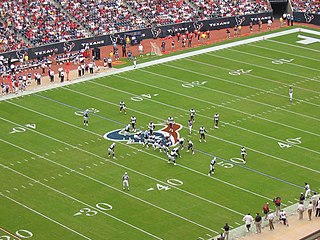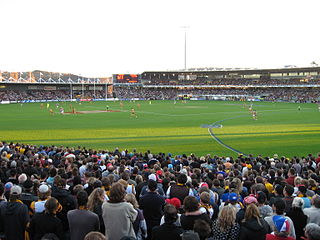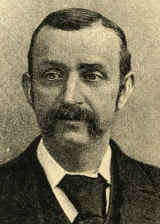
Canadian football is a sport played in Canada in which two teams of 12 players each compete for territorial control of a field of play 110 yards (101 m) long and 65 yards (59 m) wide attempting to advance a pointed oval-shaped ball into the opposing team's scoring area.

Futsal is a ball sport played on a hard court, smaller than a football pitch, and mainly indoors. It has similarities to five-a-side football.
In sports, a time-out or timeout is a halt in the play. This allows the coaches of either team to communicate with the team, e.g., to determine strategy or inspire morale, as well as to stop the game clock. Time-outs are usually called by coaches or players, although for some sports, TV timeouts are called to allow media to air commercial breaks. Teams usually call timeouts at strategically important points in the match, or to avoid the team being called for a delay of game-type violation, such as the five-second rule in basketball.

Gameplay in American football consists of a series of downs, individual plays of short duration, outside of which the ball is dead or not in play. These can be plays from scrimmage – passes, runs, punts, or field goal attempts – or free kicks such as kickoffs and fair catch kicks. Substitutions can be made between downs, which allows for a great deal of specialization as coaches choose the players best suited for each particular situation. During a play, each team should have no more than 11 players on the field, and each of them has specific tasks assigned for that specific play.
In gridiron football, clock management is the manipulation of a game clock and play clock to achieve a desired result, typically near the end of a match. It is analogous to "running out the clock" seen in many sports, and the act of trying to hasten the game's end is often referred to by this term. Clock management strategies are a significant part of American football, where an elaborate set of rules dictates when the game clock stops between downs, and when it continues to run.

The rules of basketball are the rules and regulations that govern the play, officiating, equipment and procedures of basketball. While many of the basic rules are uniform throughout the world, variations do exist. Most leagues or governing bodies in North America, the most important of which are the National Basketball Association and NCAA, formulate their own rules. In addition, the Technical Commission of the International Basketball Federation (FIBA) determines rules for international play; most leagues outside North America use the complete FIBA ruleset.

The rules of Australian rules football were first formed by the Melbourne Football Club in 1859, and been refined over the years as the game evolved into its modern form. The laws significantly predate the advent of a governing body for the sport. The first national and international body, the Australasian Football Council, was formed in 1905 to govern Australian Football. Since 1994, the rules for the game known as Australian football have been governed by the AFL and the organisation's Laws of the Game committee.
In sports, running out the clock is the practice of a winning team allowing the clock to expire through a series of pre-selected plays, either to preserve a lead or hasten the end of a one-sided contest. Such measures expend time, but do not otherwise have a tactical purpose. This is usually done by a team that is winning by a slim margin near the end of a game, in order to reduce the time available for the opposing team to score. Generally, it is the opposite strategy of running up the score.

A set shot in Australian rules football is a kick for goal in which the player can 'set' themselves, rather than have to quickly react during the play. A set shot occurs when a player has been awarded a free kick, or has taken a mark within kicking range of the goal. There is always one opponent allowed to be "on the mark", who can attempt to distract the kicker by gesticulation or verbal intimidation. The game clock continues to run during the preparation for a set shot, although time on may temporarily be blown to return the football to the kicker.

The AFL siren controversy surrounded the conclusion and result of an Australian rules football match played on 30 April 2006 during Round 5 of the Australian Football League's 2006 season. The match was played between the St Kilda and Fremantle Football Clubs at Aurora Stadium in Launceston, Tasmania.
Delay of game is an action in a sports game in which a player or team deliberately stalls the game, usually with the intention of using the delay to its advantage. In some sports, the delay of game is considered an infraction if it is longer than that permitted according to the game's rules, in which case a penalty can be issued. Some sports that have a delay of game penalty are American football, Canadian football, ice hockey and association football.
In Australian rules football, if a player takes a mark or is awarded a free kick shortly before the siren sounds to end a quarter, the player is allowed to take the kick after the siren. Often, the result of this kick is of little consequence, but if the player is within range of goal, any score will count towards the final result.
The 1966 VFL Grand Final was an Australian rules football game contested between the Collingwood Football Club and St Kilda Football Club, held at the Melbourne Cricket Ground in Melbourne on 24 September 1966. It was the 70th annual grand final of the Victorian Football League (VFL), staged to determine the premiers for the 1966 VFL season. The match, attended by 101,655 spectators, was won by St Kilda by a margin of one point, marking that club's first and only premiership victory to date.

This list is an alphabetical glossary of Australian rules football terms, jargon and slang. While some of these entries are shared with other sports, Australian rules football has developed a unique and rich terminology.

Rugby league match officials are responsible for fairly enforcing the Laws of the Game from a neutral point of view during a match of rugby league football and imposing penalties for deliberate breaches of these Laws. The most senior match official is the referee. They may be assisted by a range of other officials depending on the level and rules of the competition.
The 1996 AFL Lightning Premiership was an Australian rules football knock-out competition, played in its entirety before the Australian Football League's main pre-season competition began. The Lightning Premiership was held for the only time in the modern era in 1996 - the Centenary Season of the AFL. It was a knock-out competition played from Friday, 9 February until Sunday, 11 February, with four games each evening at Waverley Park, each consisting of two 17.5 minute halves. The game trialled a number of highly experimental rules, including three points awarded both for deliberate rushed behinds and balls which hit the goalposts, and timekeepers not blowing the siren if scores were tied. However, the rule which altered play most significantly was the ball not being thrown in from the boundary line after travelling out of bounds, a free kick being awarded instead against the last team to touch the ball. Essendon won the title defeating Brisbane by 17 points in the Grand Final.
The 1967 Tasmanian State Premiership Final was an Australian rules football match played between the Wynyard Cats and the North Hobart Robins on Saturday 30 September 1967 at West Park Oval, Burnie, to decide the winner of the 1967 Tasmanian State Premiership. One of the most controversial games in Australian rules football history, the match was declared no result and the premiership was withheld after fans invaded the field and eventually took down the goal posts, preventing North Hobart full-forward David Collins from taking a kick after the siren which would likely have won or tied the game for the Robins.
The 1971 VFA Division 1 Grand Final was an Australian rules football match played between the Dandenong Redlegs and the Preston Bullants. The match was held on Sunday 26 September 1971 at the Junction Oval in St Kilda, Victoria, to decide Division 1 Premiership for the 1971 Victorian Football Association season.

The rules of water polo are the rules and regulations which cover the play, procedure, equipment and officiating of water polo. These rules are similar throughout the world, although slight variations do occur regionally and depending on the governing body. Governing bodies of water polo include FINA, the international governing organization for the rules; the NCAA, which govern the rules for collegiate matches in the United States; the NFHS, which govern the rules in high schools in the USA; and the IOC, which govern the rules at Olympic events.









